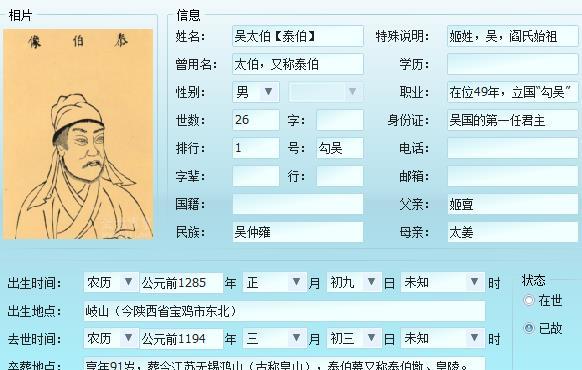Wu, one of the top ten surnames in China today, mainly originated in Wuxi, Jiangsu Province. Ranked 6th in the Song version of "Hundred Family Names". The Wu surname is also a multi-ethnic surname.
1, derived from the surname Jiang. There is a tribal leader surnamed Wu Quan with the surname Jiang, who lives in a place called Wu Shan, and posterity takes Wu as a surname.
2, originated from Zhu Rong's Wu Hui. The descendants of Emperor Huan were called Hui, and the fief was in Wu, and the history was called Wu Hui, and the descendants took Wu as their surname.
3, derived from the Surname Yao. Wu Guang, one of the leaders of the peasant revolt at the end of the Qin Dynasty, was a descendant of the Wu clan surnamed Yao.
4, derived from the surname Ji. It is also the mainstream of the Wu surname at present.
5, the Han surname of various ethnic minorities.

The Wu surname is Taibo
The ancestor of the Wu clan was Taibo, the eldest son of the father of The Prince of Zhou. Because Taibo and Zhongyong obeyed their father's wishes and gave way to the third brother Ji Li, they moved together to the "barbaric" land in Jiangnan (that is, the area around present-day Wuxi County, Jiangsu Province), which also became the main birthplace of the Wu surname.
Wu Jili
The Surname Wu is currently after Wu Jiza, the fourth son of Wu Shoumeng. After the fall of the State of Wu, it dispersed Henan, Anhui, Hubei, Zhejiang, Shandong and other places.
Wu went to Qi
The eighteenth monarch of the State of Wu. His son Wu Shoumeng became king.
Wu Shoumeng
The first monarch of the State of Wu to be called king.
Wu Wang Zhufan
Wu Wangshou dreamed of passing the throne to the virtuous Ji Zha, but Ji Zha insisted on not accepting it, so he had to appoint his eldest son Zhu Fan to take charge of the state affairs on his behalf.
Wu Wang Lu Lu
Wu WangFucha
The last monarch of the State of Wu.
Wu Jizha
When Zhu Fan's mourning period expired, he gave way to Ji Zha, and the Wu people insisted on supporting Ji Zha, and Ji Zha abandoned his wife and son and ran to other places to cultivate land. The Wu people only had Zhu Fan to inherit the throne.
This branch of the Wu clan is a descendant of Ji Zha
Wu Rui
He followed Xiang Yu to destroy Qin and was given the title of King of Hengshan, and later with Liu Bang to destroy Xiang Yu and changed his title to King of Changsha.
Wu Chen
The second king of Changsha in the Western Han Dynasty reigned for two years and became a king.